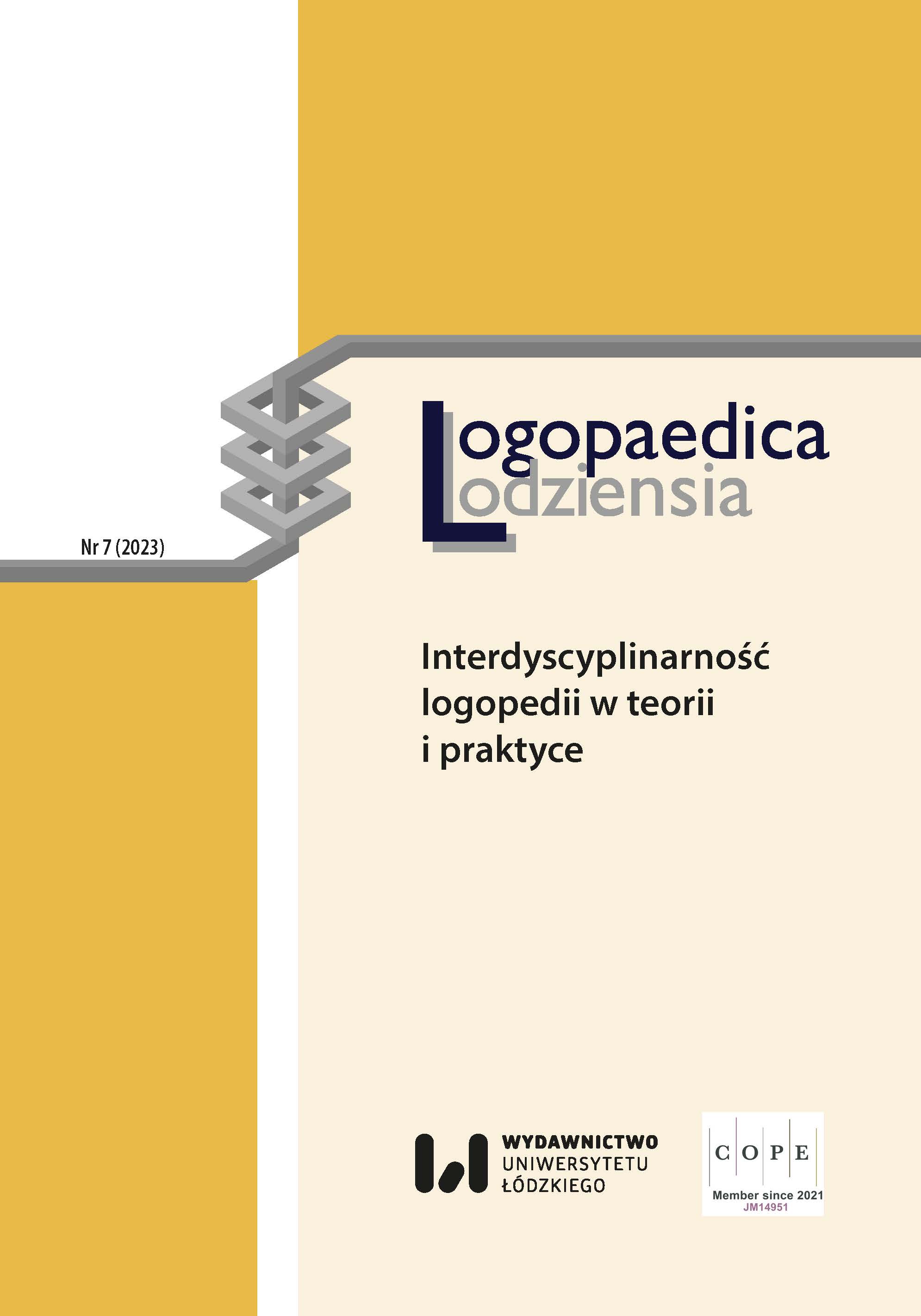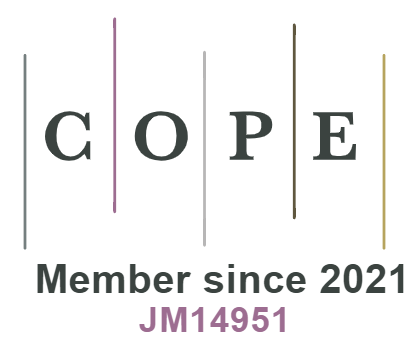A proposal for a non-antagonistic approach to disorder and order in cluttering
DOI:
https://doi.org/10.18778/2544-7238.07.05Keywords:
cosmos, chaos, chaosmos, non‑antagonistic approach, clutteringAbstract
The aim of this article is to present a different understanding of cluttering: not in the category of ‘fluency disorders’, but as a complex language and communication dis-order. A complementary approach to the phenomena of order and disorder was proposed in relation to the non‑antagonistic mythical and religious concept of the cosmos and chaos, linguistic adaptations of the theory of chaos, and considerations on the idea of chaosmos. Polish‑language speech therapy literature shows the examples of perceiving chaos and order in cluttering as mutually conditioning, non‑antagonistic forces. The article closes with postulates of opening to (neuro)diversity, bridging gaps between different language and communication orders as well as respecting by the recipients a sufficiently structured way of speaking, a way in which a clutterer communicates.
Downloads
References
Abraham F.D., 1996, Chaos, bifurcation, and self‑organization: dynamical extensions of neurological positivism and ecological psychology, https://www.researchgate.net/publication/321179033_CHAOS_BIFURCATIONS_SELF‑ORGANIZATION_DYNAMICAL_EXTENSIONS_OF_NEUROLOGICAL_POSITIVISM_ECOLOGICAL_PSYCHOLOGY_THE_HOLISTIC_MIND_AS_A_COMPLEX_DYNAMICAL_SYSTEM (accessed: 24.05.2023).
Google Scholar
Abraham E.D., Gilgen A.R. (eds.), 1995, Chaos theory in psychology, Westport: Greenwood.
Google Scholar
Bartholomew R., 2021, Chaosmopolitanism: Reconfiguring James Joyce’s Cities of Thisorder and Exiled Selves, [in:] N. Conceição, G. Ferraro, N. Fonseca, A. Dias Fortes, M.F. Molder (eds.), Conceptual Figures of Fragmentation and Reconfiguration, Lisboa: IFILNOVA – NOVA FCSH, pp. 73–99.
Google Scholar
Başar E. (ed.), 1990, Chaos in brain function, Berlin: Springer.
Google Scholar
Dąbrowska A., 2006, Analogia i anomalia w języku i językoznawstwie, [in:] K. Bakuła, D. Heck (eds.), Efekt motyla. Humaniści wobec teorii chaosu, Wrocław: Wydawnictwo Uniwersytetu Wrocławskiego, pp. 54–61.
Google Scholar
Deleuze G., Guattari F., 2000, Co to jest filozofia?, trans. P. Pieniążek, Gdańsk: słowo/obraz terytoria.
Google Scholar
Guattari F., 1995, Chaosmosis: an Ethico‑aesthetic Paradigm, Bloomington–Indianapolis: P. Bains and J. Pefanis.
Google Scholar
ICD–10, 2008, International Statistical Classification of Diseases and Related Health Problems. 10 revision, WHO, Geneva, https://stat.gov.pl/Klasyfikacje/doc/icd10/pdf/ICD10TomI.pdf (accessed: 15.05.2023).
Google Scholar
ICD–11, n.d., International Classification of Diseases 11th Revision, WHO, https://icd.who.int/en (ac cessed:15.05.2023).
Google Scholar
ICF, 2001, Międzynarodowa Klasyfikacja Funkcjonowania, Niepełnosprawności i Zdrowia, WHO, Geneva, https://ezdrowie.gov.pl/downloadFile/740 (accessed: 15.05.2023).
Google Scholar
Janiak M., 2008, Komunikacja a teoria chaosu: powiązania interdyscyplinarne, “Praktyka i Teoria Informacji Naukowej i Technicznej”, Vol. 16(3), pp. 3–12.
Google Scholar
Joyce J., 1999, Finnegans Wake, London: Penguin Books.
Google Scholar
Kaczmarek L. (ed.), 1981, Program studiów logopedycznych, Lublin: Wydawnictwo Uniwersytetu Marii Curie‑Skłodowskiej.
Google Scholar
Kaźmierczak M., 2022, Perspektywa klienta w giełkocie, “Logopaedica Lodziensia”, No. 6, pp. 117–134.
Google Scholar
Kleszczowa K., 2006, Dobrodziejstwo chaosu znaków językowych, [in:] K. Bakuła, D. Heck (eds.), Efekt motyla. Humaniści wobec teorii chaosu, Wrocław: Wydawnictwo Uniwersytetu Wrocławskiego, pp. 47–53.
Google Scholar
Kleszczowa K., 2012, Mała przyczyna, poważne skutki. Rzecz o zrywaniu więzi etymologicznej, [in:] D. Heck, K. Bakuła (eds.), Efekt motyla. Humaniści wobec teorii chaosu 2, Kraków: Księgarnia Akademicka, pp. 351–360.
Google Scholar
Mitchener W., Nowak M., 2004, Chaos and Language, “Proceedings of The Royal Society of London. Series B, Biological Sciences”, Vol. 271(1540), pp. 701–704.
Google Scholar
Myers F.L., 2018, Istota mowy bezładnej a interwencja logopedyczna w giełkocie, [in:] K. Węsierska, K. Gaweł (eds.), Zaburzenia płynności mowy, Gdańsk: Harmonia Universalis, pp. 44–63.
Google Scholar
Ochman J., 2017, Kosmos‑chaos jako kategorie ontologiczne filozofii bezpieczeństwa, “Kultura Bezpieczeństwa. Nauka – Praktyka – Refleksje”, No. 25, pp. 185–219.
Google Scholar
Pastuchowa M., 2006, Ślad czy obecność? Staropolskie leksemy czasownikowe we współczesnej polszczyźnie, [in:] K. Bakuła, D. Heck (eds.), Efekt motyla. Humaniści wobec teorii chaosu, Wrocław: Wydawnictwo Uniwersytetu Wrocławskiego, pp. 85–91.
Google Scholar
Piela M., 2006, Uporządkowany nieporządek? O zjawisku redundancji na przykładzie nazw subiektów czynności pisania i czytania, [in:] K. Bakuła, D. Heck, (eds.) Efekt motyla. Humaniści wobec teorii chaosu, Wrocław: Wydawnictwo Uniwersytetu Wrocławskiego, pp. 73–84.
Google Scholar
Rejter A., 2006, Leksyka ekspresywna w historii języka polskiego. Kulturowo‑komunikacyjne konteksty potoczności, Katowice: Wydawnictwo Uniwersytetu Śląskiego.
Google Scholar
Robertson R., Combs A. (eds.), 1995, Chaos theory in psychology and the life sciences, Hillsdale: Lawrence Erlbaum.
Google Scholar
Spruit M., 2017, Giełkot. Jak zrozumieć osoby mówiące niewyraźnie. Podręcznik diagnostyki i terapii, trans. A. Robak, Kraków: Wydawnictwo Edukacyjne.
Google Scholar
Tarkowski Z., Góral‑Półrola J., Reichel I., 2017, Mowa bezładna, [in:] Z. Tarkowski (ed.), Patologia mowy, Gdańsk: Harmonia Universalis, pp. 165–195.
Google Scholar
Tarkowski Z., Smul M., 1988, Giełkot, Warszawa: Wydawnictwo ZSL.
Google Scholar
Tempczyk M., 1995, Świat harmonii i chaosu, Kraków: PIW.
Google Scholar
Tempczyk M., 1998, Teoria chaosu a filozofia, Warszawa: Wydawnictwo CiS.
Google Scholar
Węsierska K., Myszka A., Płusajska‑Otto A., St. Louis K.O., 2015, Osoby z giełkotem w społeczeństwie – diagnostyka, świadomość społeczna, postulaty, [in:] K. Węsierska (ed.), Zaburzenia płynności mowy. Teoria i praktyka, Vol. 1, Katowice: KOMLOGO, pp. 251–264.
Google Scholar
Wielki słownik języka polskiego, n.d., https://wsjp.pl/ (accessed: 24.05.2023).
Google Scholar
Yang T., 2003, Dynamics of Vocabulary Evolution, “International Journal of Computational Cognition”, Vol. 1(1), pp. 1–19.
Google Scholar
Downloads
Published
Versions
- 2023-12-01 (2)
- 2023-11-29 (1)
How to Cite
Issue
Section
License

This work is licensed under a Creative Commons Attribution-NonCommercial-NoDerivatives 4.0 International License.












